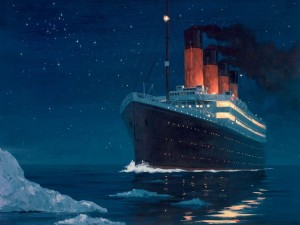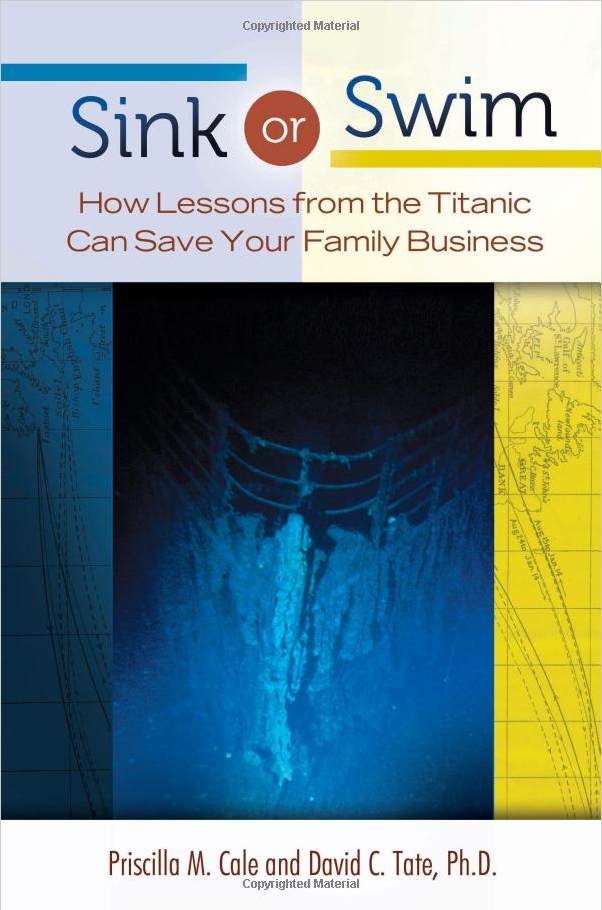When you hear the name “Titanic” – likely your mind drifts to James Cameron’s 1997 epic film about love and tragedy; yet, others are diving deeper into the reality of the Titanic and the lessons derived from the tragedy.
In a new book directed at family enterprise, Priscilla M. Cale and David C. Tate examine the causes of the sinking Titanic and derive key, meaningful interpretations of the event that can benefit those engaged in family enterprise. Their book, titled Sink or Swim: How Lessons from the Titanic Can Save your Family Business practically examines the failure of Titanic and translates these failures into guidelines for family business.
The text proposes five key failures leading to the eventual sinking of Titanic, and how those same failures can negatively impact a family enterprise. A summary of the failures follows:
1. Overconfidence: Whether informed from historical fact or from the blockbuster film, it is clear that overconfidence was a key flaw apparent in many elements of the Titanic experience. From too few lifeboats to pushing the ship at max capacity in iceberg-laden waters, the Titanic was overwhelmingly overconfident in a myriad of circumstances.
Akin to Family Enterprise, overconfidence can breed unrealistic expectations and often “sugar coating” of bad news. When it comes to overconfidence, think of Titanic and their errors — often self-awareness is the greatest tool to avoid overconfidence.
2. Ineffective Leadership: Again with the icebergs! Captain Edward J. Smith ignored frequent “ice warnings” as the ship approached New York City; further, Smith failed to stand his ground in the face of White Star Cruise Line owner Bruce Ismay with regard to the speed Titanic reached on its final night.
Effective leadership is essential for family business success. On our website, The Peer Alliance provides a list of Critical Issues and how those issues impact family enterprise. Understanding the issue and taking appropriate action is essential for success.
3. Planning and Preparation: In the case of Titanic, a total lack of both occurred. The aforementioned issues of avoiding ice warnings, speeding through the night amidst icebergs and the lack of available life boats strictly for the “comfort” of the high society passengers. Clearly Titanic’s overconfidence led to poor planning and preparation, a medley of errors eventually leading to its demise.
The Peer Alliance advocates planning and preparation for family business in a variety of forms. Whether it’s succession planning, estate planning or transition of ownership — our combined 65 years of family business experience have shown us that no two situations are exactly the same.
4. Quality in Product or Service: Steve Jobs was a master of providing quality in Apple’s products that went as deep as the types of screws used on an internal mount within the iPhone. Jobs recalled the lessons of his father, a carpenter by hobby, who taught Jobs that quality should extend beyond what the consumer can visibly see — to go as deep as the interior of the products.
Regarding Titanic, Bruce Ismay skimped on materials and labor to reduce the cost of the ship. Doing so created a ship that was designed to push the limits of its chosen materials — the result of which made the ship extremely fragile in the face of danger.
Authors Cale and Tate advocate the use of written agreements, policies and procedures wherever possible. To read more about The Peer Alliance’s thoughts on practical applications of written policies and procedures, consult our previous blog post here.
5. Team Breakdown: Fragmentation ran rampant on Titanic. In addition to what was visibably obvious in the film, historians note that Captain Smith completely rearranged his senior officer team just before the voyage! At the heart of breakdowns and fragmentations is emotional baggage — a trait common in the family business environment.
Again, self-awareness is crucial when it comes to operating within successful teams. Additionally, keeping the communication focused on the task at hand — specifically, do not discuss family matters at the office and do not discuss business matters at the dinner table.
To pick-up a copy of Sink or Swim: How Lessons from the Titanic Can Save your Family Business — click on the title or the link here.
For further reading about the book, Henry Hutcheson provides a well written summation of the text for the News Observer Family Business Column here.
Thanks for reading, and enjoy the holiday weekend!


